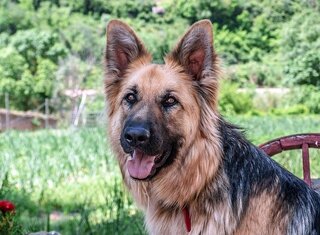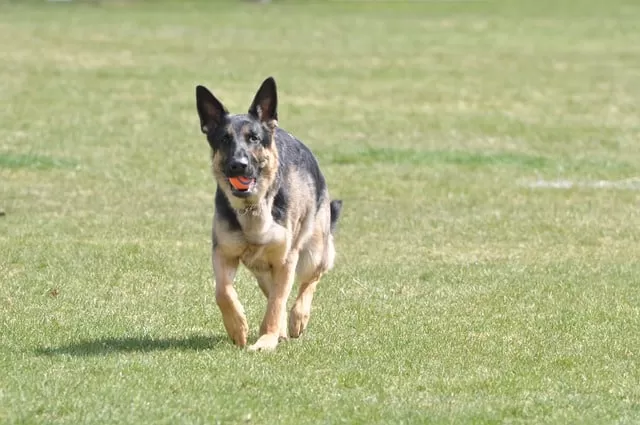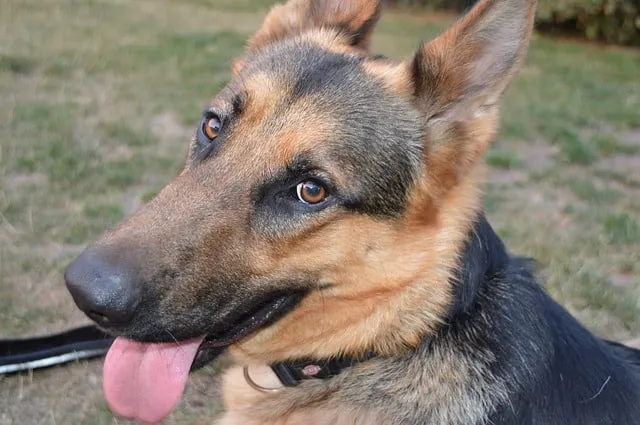German Shepherds are one of the most beloved dog breeds in the world. They’re known for their loyalty, intelligence, and good looks.
But did you know that some people are allergic to German Shepherds? It’s true! If you’re looking for a new four-legged friend, you should be aware of the potential for allergies to German Shepherds. Here’s what you need to know about allergies to this beloved breed.
In the following article, I will tell you what is dog allergies and How To Own A German Shepherd When You Have Allergies?
Dog Allergies
Dog allergies differ between breeds. A person may be allergic to one friend’s dog but not another’s.
If you are considering getting a dog and have allergies, spend time with different breeds and see if there is a difference.
According to Wikipedia, “A hypoallergenic dog breed is a dog breed that is purportedly more compatible with allergic people than other breeds.”
Many people still claim that there are no real “hypoallergenic breeds. Some breeds that are thought to be hypoallergenic are listed below.
Many have less fur than others and less fur does mean less dander, although no dog is 100% hypoallergenic.
- Poodle
- Labradoodle
- West Highland white terrier
- Shih Tzu
- Bichon Frise
- Maltese
- Miniature schnauzer
.

For your dog’s vitamin supplement, food, toys, or other dogs product please visit the Sundays for Dogs website.
What Is Hypoallergenic?
According to the Oxford dictionary, hypoallergenic means, “relatively unlikely to cause an allergic reaction.” Hypoallergenic also means that a product may contain fewer allergens, which are substances that produce allergies.
People that suffer from allergies have an imbalance in their immune systems. When exposed to certain foods or environmental triggers that don’t affect other people, their immune system goes haywire, producing histamines or antibodies and in turn causing a whole host of symptoms. Symptoms of reactions can be mild or severe.
A food allergy can cause hives, swelling of the tongue, lips, and throat, and anaphylaxis, which is life-threatening.
The same symptoms can occur for an allergy to bee stings… Drug allergies can also be life-threatening.
Allergic rhinitis or hay fever causes uncomfortable symptoms such as itchy, watery eyes, sneezing, and stuffy or runny nose. Hay fever is not life-threatening and can be controlled with allergy medications.
Allergies that many suffer from are to foods, such as shellfish and nuts, plants and weeds, and to animals, usually dogs and cats.
The last, animal allergy, is one that is tough if you are longing for a furry pet, dog, or cat, and you are allergic.
If you are allergic to an animal, again, symptoms may be mild or severe. Symptoms can range from runny nose and watery, itchy eyes, sneezing, itchy throat or nose, cough, postnasal drip, or dark undereye circles.
Some pet allergies may even include symptoms of asthma-like wheezing, chest tightness, coughing, and shortness of breath.
The symptoms of pet allergy sufferers may not just be limited to the respiratory system. They may experience allergic dermatitis, eczema, and hives. This can be caused by direct contact with a pet’s saliva or urine.
Allergies are a force to reckon with if you suffer from them. Medication and allergy shots are available for most allergies and sticking with hypoallergenic products is recommended, especially for skin allergies. If you are allergic to dogs that may be a sad dilemma especially if you really want one.
To check your shepherds’ health status or their DNA checks, please visit the Embark vet website for all the help you may need.

Hypoallergenic Dogs
So, you are allergic to dogs, at least some you’ve been around but are you any hypoallergenic? There really is not any hypoallergenic dog breed. Some breeds may simply cause relatively fewer symptoms of allergies than others.
You may also think that getting a breed with less hair may cause no allergy symptoms. In fact, it’s not the fur that causes allergies, it’s the dander that is the problem.
Dander is actually the dead skin that is shed from a dog’s body and gets caught in its fur.
People that have pet allergies may also get hives or a rash when their skin comes in contact with their pet’s saliva or urine. Protein in urine and saliva causes these symptoms in those that are allergic.
Dog Allergies
Dog allergies differ between breeds. A person may be allergic to one friend’s dog but not another’s.
If you are considering getting a dog and have allergies, spend time with different breeds and see if there is a difference.
According to Wikipedia, “A hypoallergenic dog breed is a dog breed that is purportedly more compatible with allergic people than other breeds.”
Many people still claim that there are no real “hypoallergenic breeds. Some breeds that are thought to be hypoallergenic are listed below.
Many have less fur than others and less fur does mean less dander, although no dog is 100% hypoallergenic.
- Poodle
- Labradoodle
- West Highland white terrier
- Shih Tzu
- Bichon Frise
- Maltese
- Miniature schnauzer
How To Own A German Shepherd When You Have Allergies?
You have your heart set on a German shepherd but you may be allergic, what can you do? If your allergies are not severe, never fear. Listed below are some tips to try to help you stay comfortable.
Time
Spend some time with a German shepherd, a friend, or at a breeder’s to see if you are truly allergic and how severe your allergy is.
Medication
If your German shepherd causes you to have allergy symptoms that aren’t too severe, try allergy medication. Most are available over the counter and are a lifesaver for many allergy sufferers. Most are non-drowsy and have no side effects.
Brushing
Brush your German shepherd regularly, preferably outdoors so as not to release dander all over your home. If you brush them once or twice a week, it will rid them of loose hair and dander.
During their twice-a-year shedding seasons, more frequent brushing will be required. You can purchase an undercoat rake that really gets in there and removes that loose undercoat quicker than a regular brush.
Bathing
Anti-allergen shampoos are also available and they are wonderful products to bathe your German shepherd with that cut down on dander.
They neutralize allergens and also keep the skin of your pup and coat healthy with less flaky skin. These are definitely worth a try.
Restrictions
If you are allergic to your shepherd, you may need to restrict them from certain areas of your home. At least keep them out of your bedroom and especially of your bed.
This means not letting your pup sleep in the same bed as you. This is never a good idea, allergies or not.
Vacuum
Your vacuum cleaner will be your best friend in the battle against allergies. Vacuum often to keep the dander way down. Don’t forget the couches and chairs.
Even if your pup doesn’t get up on them, blowing fur and your pup rubbing up against furniture causes dander to stick. More frequent vacuuming will be needed in spring and fall.
Wash clothes
Wash your clothes after hanging out with your shepherd. Hair and dander stick to these as well.
Air filtration system
Investing in an air filtration system may be worth it and some can be installed especially for removing pet dander.
If after spending time with a German shepherd, your allergies are just too severe you may need to consider adding a different breed to your family.
With controllable allergies, a German shepherd can work well in your household by following the tips above. Hopefully, the German shepherd will be just the right fit for you.
What Is Hypoallergenic?
We hear the word hypoallergenic almost daily. On make-up, face cream, body lotion, shampoo, and detergent labels state, “dermatologist-tested, hypoallergenic.” But, what exactly does hypoallergenic mean?
You are considering getting a German shepherd, but are German shepherds hypoallergenic?
There is not any hypoallergenic dog breed. Some breeds may simply cause relatively fewer symptoms of allergies than others.
According to the Oxford dictionary, hypoallergenic means, “relatively unlikely to cause an allergic reaction.” Hypoallergenic also means that a product may contain fewer allergens, which are substances that produce allergies.
People that suffer from allergies have an imbalance in their immune systems. When exposed to certain foods or environmental triggers that don’t affect other people, their immune system goes haywire, producing histamines or antibodies and in turn causing a whole host of symptoms. Symptoms of reactions can be mild or severe.
A food allergy can cause hives, swelling of the tongue, lips, and throat, and anaphylaxis, which is life-threatening.
The same symptoms can occur for an allergy to bee stings… Drug allergies can also be life-threatening.
Allergic rhinitis or hay fever causes uncomfortable symptoms such as itchy, watery eyes, sneezing, and stuffy or runny nose. Hay fever is not life-threatening and can be controlled with allergy medications.
Allergies that many suffer from are to foods, such as shellfish and nuts, plants and weeds, and to animals, usually dogs and cats.
The last, animal allergy, is one that is tough if you are longing for a furry pet, dog, or cat, and you are allergic.
If you are allergic to an animal, again, symptoms may be mild or severe. Symptoms can range from runny nose and watery, itchy eyes, sneezing, itchy throat or nose, cough, postnasal drip, or dark undereye circles.
Some pet allergies may even include symptoms of asthma-like wheezing, chest tightness, coughing, and shortness of breath.
The symptoms of pet allergy sufferers may not just be limited to the respiratory system. They may experience allergic dermatitis, eczema, and hives. This can be caused by direct contact with a pet’s saliva or urine.
Allergies are a force to reckon with if you suffer from them. Medication and allergy shots are available for most allergies and sticking with hypoallergenic products are recommended, especially for skin allergies. If you are allergic to dogs that may be a sad dilemma especially if you really want one.
Hypoallergenic Dogs
So, you are allergic to dogs, at least some you’ve been around but are you any hypoallergenic? There really is not any hypoallergenic dog breed. Some breeds may simply cause relatively fewer symptoms of allergies than others.
You may also think that getting a breed with less hair may cause no allergy symptoms. In fact, it’s not the fur that causes allergies, it’s the dander that is the problem.
Dander is actually the dead skin that is shed from a dog’s body and gets caught in its fur.
People that have pet allergies may also get hives or a rash when their skin comes in contact with their pet’s saliva or urine. Protein in urine and saliva causes these symptoms in those that are allergic.

Are German Shepherds Hypoallergenic?
If any breed is really hypoallergenic for sure, no one really is positive, but the German shepherd was not listed above so I’m afraid they are not a hypoallergenic breed.
German shepherds shed all year long and in spring and fall, they lose their coat, which adds up to a great amount of fur mixed with dander everywhere.
The shepherd has a double-thick coat and in the fall, the undercoat is pushed out by their new and more insulated winter coat in anticipation of the cold, frigid weather to come.
In spring, that very thick winter coat comes out so your pup is cooler in summer. This twice-a-year loss of coats is known as “blowing” their coat. If you have allergies, this may cause a multitude of symptoms to become worse.
With a lot of that fur floating around your house, dander is also exploding everywhere and it will be on floors, couches, beds, etc., and very hard to contain.
